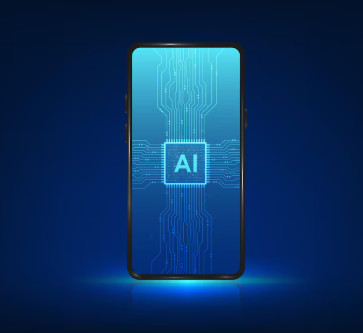views
Understanding AI in Mobile App Development
AI in mobile app development is revolutionizing how businesses create and deliver mobile experiences. Artificial intelligence enables mobile applications to learn, adapt, and make intelligent decisions without explicit programming for every scenario. This technology transforms static apps into dynamic, personalized experiences that evolve with user behavior.
According to Forbes, the global artificial intelligence market size was valued at $146.5 billion in 2024 which is expected to hit the milestone of $1,811.8 billion by the end of 2030 with a CAGR of 37.3%. This exponential growth demonstrates why business owners must understand AI's potential in mobile applications.
Modern AI integration in mobile app development goes beyond simple automation. It encompasses machine learning algorithms, natural language processing, computer vision, and predictive analytics that collectively enhance user experiences and drive business growth.
What Makes AI-Powered Mobile Apps Different?
Traditional mobile apps follow predetermined logic patterns, while AI-powered applications continuously learn from user interactions, environmental data, and behavioral patterns. This fundamental difference enables:
- Predictive capabilities that anticipate user needs before they're expressed
- Personalized experiences that adapt to individual preferences
- Intelligent automation that reduces manual user input
- Real-time decision making based on complex data analysis
Cost to Build an AI Mobile App in 2025
Understanding the cost to build an AI mobile app in 2025 is crucial for business planning and ROI calculations. Development costs vary significantly based on complexity, features, and implementation scope.
Basic AI App Development Costs
Simple AI apps with basic functionalities can be developed relatively quickly and cost-effectively, with estimated development times of up to three months and costs ranging from $70,000 to $150,000 for a basic MVP.
Advanced AI App Development Costs
Developing an AI-powered application typically costs between $50,000 and upwards of $500,000. This highly variable price range depends significantly on the app's complexity and feature set.

Cost Breakdown by App Type
- Simple AI Apps: $30,000 - $80,000
- Medium Complexity Apps: $80,000 - $200,000
- Enterprise-Grade AI Solutions: $200,000 - $500,000+
Factors influencing costs include:
- AI Model Complexity: Custom machine learning models require more development time
- Data Integration: Connecting multiple data sources increases complexity
- Platform Requirements: iOS and Android development considerations
- Third-Party APIs: Integration with external AI services
- Security Features: Enhanced data protection and privacy compliance
Benefits of AI in Mobile App Development
The benefits of AI in mobile app development extend far beyond technical capabilities, directly impacting business outcomes and user satisfaction.
Enhanced User Experience
AI enables apps to understand user preferences, predict needs, and deliver personalized content. This results in:
- Increased user engagement rates
- Higher app retention rates
- Improved customer satisfaction scores
- Reduced user acquisition costs
Operational Efficiency
AI automates routine tasks, processes data intelligently, and provides actionable insights:
- Automated Customer Support: AI chatbots handle 80% of routine inquiries
- Predictive Maintenance: Anticipate system issues before they occur
- Data Analysis: Real-time insights from user behavior patterns
- Resource Optimization: Efficient allocation of computational resources
Competitive Advantage
Early AI adoption provides significant market advantages:
- Innovation Leadership: Stand out in crowded app markets
- User Loyalty: Superior experiences create strong brand attachment
- Market Intelligence: AI-driven insights inform strategic decisions
- Scalability: AI systems adapt to growing user bases efficiently
How Is AI Used in Mobile App Development Today?
Modern AI implementation in mobile apps spans multiple technologies and use cases:
Machine Learning Integration
- Recommendation Systems: Netflix-style content suggestions
- Fraud Detection: Real-time transaction monitoring
- Image Recognition: Visual search and object identification
- Behavioral Analysis: User pattern recognition and prediction
Natural Language Processing
- Voice Commands: Siri and Google Assistant integration
- Text Analysis: Sentiment detection and content classification
- Language Translation: Real-time multilingual communication
- Chatbot Intelligence: Conversational AI for customer service
Computer Vision Applications
- Document Scanning: Automated data extraction from photos
- Augmented Reality: Real-world object recognition and overlay
- Facial Recognition: Biometric authentication and security
- Visual Search: Product identification through camera input
Top Use Cases of AI in Mobile Apps for 2025
Understanding practical applications helps business owners identify opportunities for AI integration.
AI in Healthcare Mobile Apps
AI in Healthcare Mobile Apps is transforming the industry by enabling:
- Diagnostic Assistance: AI-powered symptom checkers and medical imaging analysis
- Treatment Recommendations: Personalized therapy suggestions based on patient data
- Drug Discovery: Accelerated pharmaceutical research and development
- Telemedicine Enhancement: Intelligent patient triage and consultation routing
Example: Babylon Health uses AI to assess symptoms and provide medical consultations through conversational interfaces.

AI in Banking and Finance
AI in Banking and Finance is revolutionizing the industry through advanced applications such as:
- Fraud Prevention: Real-time transaction monitoring and anomaly detection
- Credit Scoring: Alternative data analysis for loan approvals
- Investment Advice: Robo-advisors providing personalized portfolio management
- Customer Service: Intelligent chatbots handling account inquiries
Example: JPMorgan Chase's COiN system processes legal documents 360,000 times faster than human lawyers.
AI in Retail Industry
AI in Retail Industry is reshaping customer experiences and operational efficiency through:
- Personalized Shopping: Product recommendations based on browsing history
- Visual Search: Find products by uploading photos
- Inventory Management: Demand forecasting and stock optimization
- Price Optimization: Dynamic pricing based on market conditions
Example: Amazon's recommendation engine drives 35% of the company's revenue through personalized product suggestions.
AI in Transportation and Logistics
Transportation apps implement AI for:
- Route Optimization: Real-time traffic analysis and alternative path suggestions
- Predictive Maintenance: Vehicle health monitoring and service scheduling
- Autonomous Navigation: Self-driving capabilities and safety features
- Supply Chain Management: Intelligent warehouse operations and delivery optimization
Artificial Intelligence in iOS App Development
Artificial intelligence in iOS app development benefits from Apple's comprehensive AI frameworks and hardware optimization.
Core ML Integration
Apple's Core ML framework enables:
- On-Device Processing: Faster performance and enhanced privacy
- Model Optimization: Efficient resource utilization
- Hardware Acceleration: Leveraging A-series chip capabilities
- Easy Integration: Simplified AI model deployment
iOS-Specific AI Features
- Siri Integration: Voice command capabilities
- Face ID Technology: Advanced biometric authentication
- ARKit Enhancement: AI-powered augmented reality experiences
- Camera Intelligence: Real-time image processing and analysis
Artificial Intelligence in Android App Development
Artificial intelligence in Android app development leverages Google's extensive AI ecosystem and cloud services.
TensorFlow Lite Integration
Google's TensorFlow Lite provides:
- Cross-Platform Compatibility: Consistent AI performance across devices
- Model Flexibility: Support for various machine learning frameworks
- Cloud Integration: Seamless connection to Google Cloud AI services
- Real-Time Processing: Efficient on-device AI computation
Android-Specific AI Capabilities
- Google Assistant Integration: Conversational AI interfaces
- ML Kit Features: Pre-trained models for common AI tasks
- Android Neural Networks API: Hardware-accelerated AI processing
- Google Cloud AI: Scalable cloud-based AI services
Choosing the Right AI Mobile App Development Company
Selecting the best AI app development company in Middle East or your region requires careful evaluation of several factors.
Technical Expertise Assessment
- AI Framework Proficiency: Experience with TensorFlow, PyTorch, Core ML
- Platform Specialization: iOS and Android development capabilities
- Industry Knowledge: Understanding of your specific business domain
- Portfolio Quality: Previous AI app development projects and results
Development Process Evaluation
- Agile Methodology: Iterative development and continuous improvement
- Data Security: Robust privacy protection and compliance measures
- Quality Assurance: Comprehensive testing and validation procedures
- Post-Launch Support: Ongoing maintenance and feature updates
Regional Considerations
When selecting an AI mobile app development agency in UAE or Middle East:
- Cultural Understanding: Local market knowledge and user preferences
- Regulatory Compliance: Regional data protection and privacy laws
- Language Support: Arabic and English multilingual capabilities
- Time Zone Alignment: Efficient communication and project management
Implementation Strategy for Business Owners
Step 1: Define AI Objectives
- Identify specific business problems AI can solve
- Establish measurable success metrics
- Determine budget allocation and timeline
- Assess existing data infrastructure
Step 2: Choose Development Approach
- Custom Development: Tailored solutions for unique requirements
- Third-Party APIs: Faster implementation with proven AI services
- Hybrid Approach: Combination of custom and pre-built solutions
- Progressive Enhancement: Gradual AI feature integration
Step 3: Data Strategy Planning
- Data Collection: Establish comprehensive data gathering processes
- Data Quality: Ensure accurate and relevant information
- Privacy Compliance: Implement robust data protection measures
- Storage Solutions: Scalable and secure data infrastructure
Future Trends in AI Mobile App Development
Emerging Technologies
- Edge AI: Processing AI computations directly on mobile devices
- Quantum Computing: Revolutionary processing capabilities for complex AI models
- Augmented Intelligence: Human-AI collaboration for enhanced decision-making
- Federated Learning: Decentralized AI training while preserving privacy
Industry Evolution
In 2025 and beyond, the evolution of mobile AI will be defined by deeper integration, greater efficiency, and expanding capabilities across both consumer and enterprise ecosystems.
Conclusion
AI in mobile app development represents a transformative opportunity for business owners seeking competitive advantage and enhanced user experiences. The cost to build an AI mobile app in 2025 varies significantly based on complexity and features, but the potential return on investment makes it a strategic imperative for forward-thinking businesses.
The benefits of AI in mobile app development extend beyond technical capabilities to include operational efficiency, enhanced user experiences, and competitive differentiation. Whether implementing artificial intelligence in iOS app development or artificial intelligence in android app development, the key lies in selecting the right development partner and maintaining a clear strategic vision.
As the AI mobile app market continues expanding, businesses that embrace these technologies early will establish strong market positions and build lasting customer relationships. The future of mobile applications is intelligent, adaptive, and deeply personalized—driven by AI technologies that understand and anticipate user needs.
Ready to transform your business with AI-powered mobile apps? Contact AI app developers today to explore how artificial intelligence can revolutionize your mobile strategy and drive unprecedented growth.




Comments
0 comment